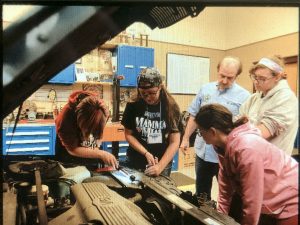Businesses Can Partner with the Community Foundation to Put Tax Dollars to Work Locally
EITC has been described as a deal that seems almost too good to be true. There may be a chance for new applicants to get in the program this year, but you must apply on July 1. Don’t miss out on this opportunity to make a difference in Carbon County!
Carbon County Community Foundation is now a registered Educational Improvement Organization with the state Department of Community and Economic Development. What this means is that CCCF is qualified to receive and distribute funds under the state’s Educational Improvement Tax Credit (EITC) program. EITC is a well-established program that aims to allow individuals and corporations with state tax liability to receive up to a 90% tax credit for contributions to qualified educational improvement programs.
Businesses authorized to do business in PA who are subject to one or more of the following taxes are eligible to apply for the program:
- Personal Income Tax
- Capital Stock/Foreign Franchise Tax
- Corporate Net Income Tax
- Bank Shares Tax
- Title Insurance & Trust Company Shares Tax
- Insurance Premium Tax (excluding surplus lines, unauthorized, domestic/foreign marine)
- Mutual Thrift Tax
- Malt Beverage Tax
- Retaliatory Fees under section 212 of the Insurance Company Law of 1921
How it works:
- Taxpayers/Donors apply to the EITC program. Renewals were due in May, new applications are due on July 1, 2019.
- If accepted, the state will notify the Taxpayer/Donor how much of their tax liability they are allowed to contribute.
- Taxpayers/Donors have 60 days to make their contributions. In this case, simply give to CCCF and we will provide a letter certifying the transaction and make the distribution to the qualified program when appropriate.
- Donors forward the letter to their tax advisor; single year commitments are worth 80% tax credit and two-year commitments are worth 90% tax credit per year.
Tax credit-qualified donations are much different than tax deductible-qualified donations. For example, a two-year commitment of $1000 per year to a qualified educational program would only cost the donor $100 per year. The donor was going to pay the state at least $1000 in taxes, but instead only owes the state $100 per year in this example. Essentially, $900 of tax liability gets written off in the form of a credit and so the $1000 donation only costs the donor $100. The donor reaps the rewards of building good relations and seeing the impact of their investment in their community.

Female students explore auto mechanics at CCTI’s nontraditional summer camp in June 2019.
“Under the program, it will cost donors relatively little to make substantial contributions to strengthen education opportunities for young people in our area,” said CCCF executive director Amber Breiner. Currently, the Foundation has just one program qualified, Carbon Career and Technical Institute’s “Nontraditional Summer Camp.” The camp introduces local girls and boys to lucrative and in-demand STEM careers which are traditionally dominated by the opposite gender, with the goal of increasing nontraditional enrollment in these technical areas. Breiner plans to work with other Carbon County area school districts to identify other qualifying programs to offer EITC-participating donors.
Contact the Foundation with any questions and learn more about the program directly from DCED’s website. CCCF is encouraging new applicants to the program from the Carbon County area and will advocate in Harrisburg for DCED to allow for greater participation from our region. Applications to the program are completed online, require only basic information, and should be completed on Monday, July 1. IMPORTANT: In the application, be sure to indicate that you would like to donate to an EIO (Educational Improvement Organization); you may also elect to participate with the other areas as well (SO and Pre-K). Please notify CCCF if you do apply so the Foundation can know approximately how many new Carbon-area applicants there are in follow up communication with the state.
